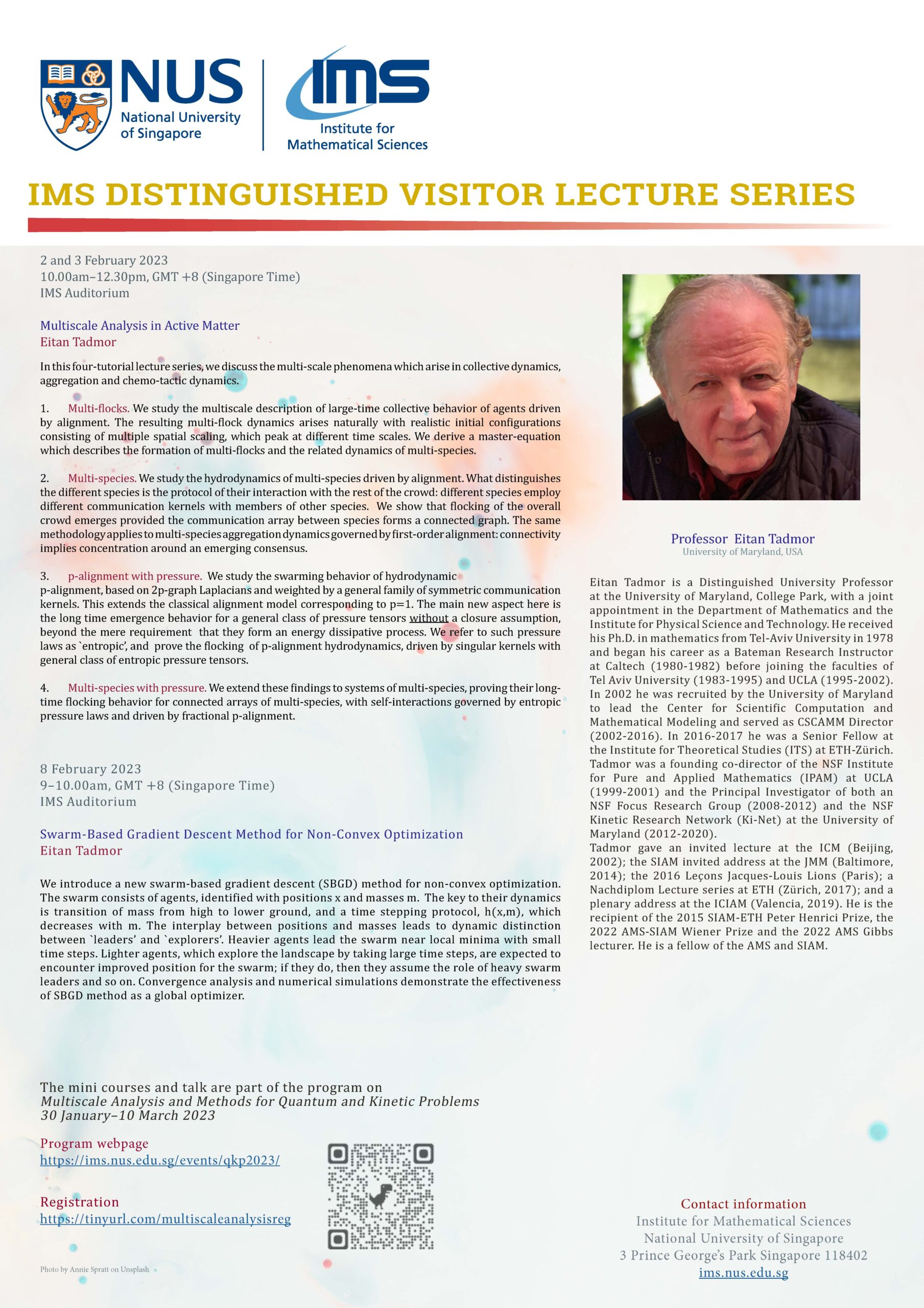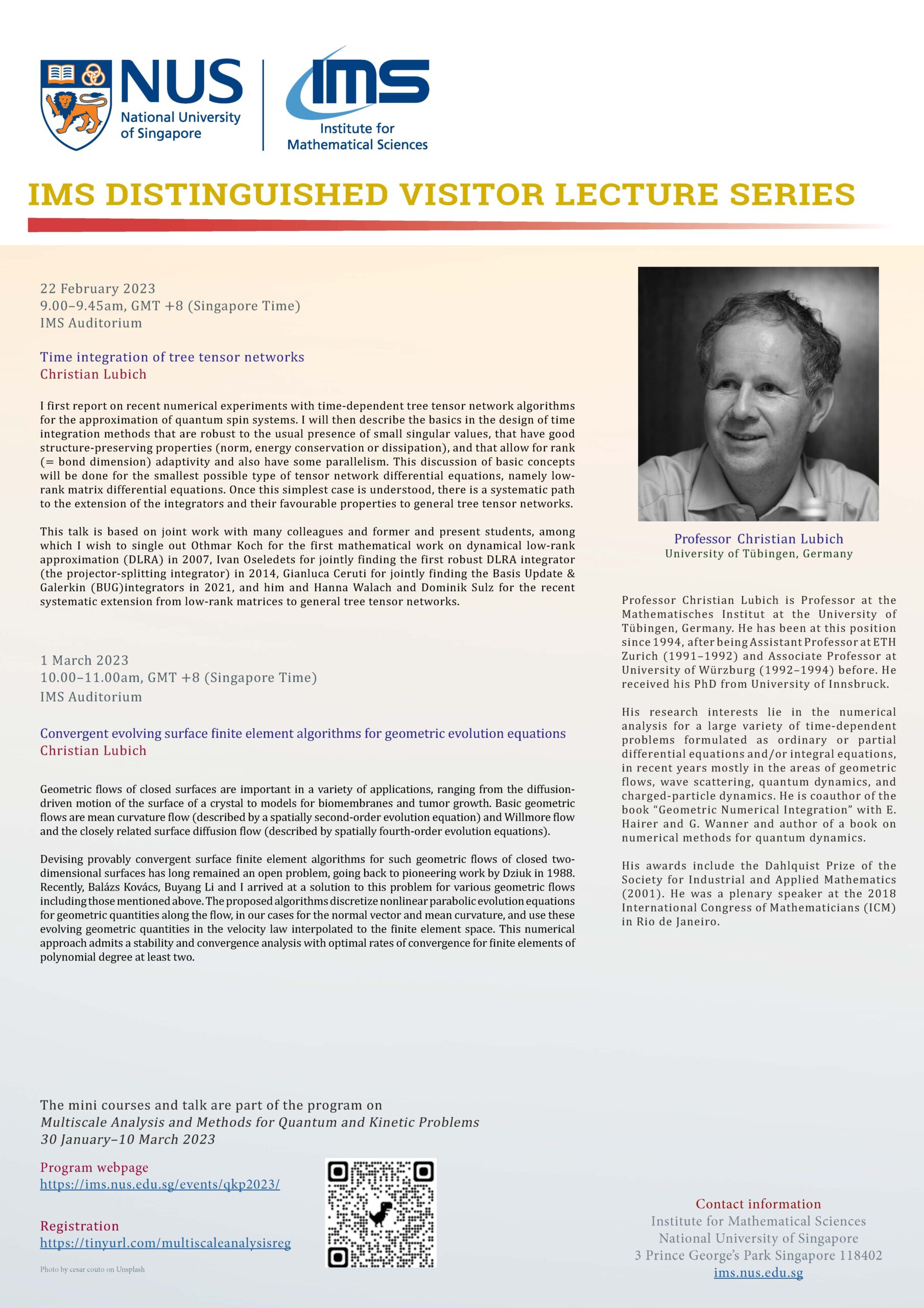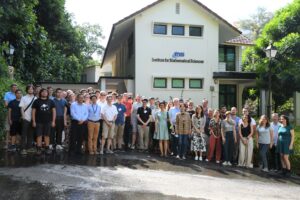Organizing Committee
Co-chairs
- Weizhu Bao (National University of Singapore)
- Peter A. Markowich (University of Vienna and King Abdullah University of Science and Technology)
- Benoît Perthame (Sorbonne Université)
- Eitan Tadmor (University of Maryland)
Members
- Yongyong Cai (Beijing Normal University)
- Jan Haskovec (King Abdullah University of Science and Technology)
- Lin Lin (University of California, Berkeley)
- Tommaso Lorenzi (Politecnico di Torino)
- Jianfeng Lu (Duke University)
- Sepideh Mirrahimi (CNRS and Université de Montpellier)
- Huy Quang Nguyen (University of Maryland)
- Changhui Tan ( University of South Carolina)
- Minh-Binh Tran (Texas A&M University)
- Yao Yao (National University of Singapore)
Contact Information
General Enquiries: imsbox2(AT)nus.edu.sg
Scientific Aspects Enquiries: matbaowz(AT)nus.edu.sg
Overview
Quantum and kinetic problems have been widely encountered in the modeling and description for many problems in science and engineering with quantum effect (wave-particle duality and/or quantization) and particle interaction as well as active matter dynamics. Over the last two decades, quantum and kinetic models have been adapted for the modeling of tremendous new experiments in physics, materials science, fluid dynamics and biology, such as Bose-Einstein condensation, fermion condensation, quantum fluids of light, degenerate quantum gas, graphene and 2D materials, etc., and for the kinetic description of emerging applications in biology and social science, such as cell migration, collective motion of active matter, network formation and dynamics in social science, coherent structures in crowd and traffic dynamics, flocking, swarming, epidemiology, etc. These new surprising experiments and emerging applications call for greater participation of mathematicians and computational scientists to address some fundamental questions related to quantum and kinetic problems, to work together with applied scientists from the modeling to computational stages, to provide mathematical analysis for justifying different models, and to design efficient and accurate computational methods.
This program will bring applied and pure mathematicians, theoretical physicists, computational materials scientists and other applied scientists together to review, develop and promote interdisciplinary researches on multiscale analysis and methods for quantum and kinetic problems that often arise in science and engineering. It will provide a forum to highlight progress in a broad range of application areas, within a coherent theme and with greater emphasis on multiscale modeling, mathematical analysis and numerical simulation for quantum and kinetic problems with emerging applications in quantum physics and chemistry, degenerate quantum gas and quantum fluids, graphene and 2D materials, network formation, collective motion in biology and social science, active matter dynamics, epidemiology, etc.
Activities
| Date | Abstract | |
|---|---|---|
| Tutorial Session 1 | 2–3 February 2023 | View |
| Workshop 1: Multiscale analysis and methods for PDEs:fluids and active matter dynamics | 6–10 February 2023 | View |
| Tutorial Session 2 | 13–17 February 2023 | View |
| Junior researcher session | 15 February 2023 | View |
| Workshop 2: Multiscale methods and analysis for dispersive PDEs and applications to quantum materials | 20–24 February 2023 | View |
| Workshop 3: Scientific computing and applications | 1 March 2023 | View |
Venue
IMS Auditorium





